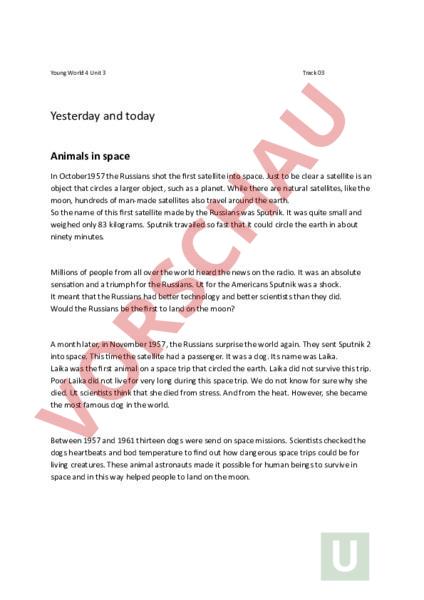Arbeitsblatt: Young World 4 Unit 3 Track03
Material-Details
Young World 4 Unit 3 Track03
Spanisch
Anderes Thema
6. Schuljahr
1 Seiten
Statistik
208682
308
4
21.02.2024
Autor/in
M H
Land: Schweiz
Registriert vor 2006
Textauszüge aus dem Inhalt:
Young World 4 Unit 3 Track 03 Yesterday and today Animals in space In October1957 the Russians shot the first satellite into space. Just to be clear satellite is an object that circles larger object, such as planet. While there are natural satellites, like the moon, hundreds of man-made satellites also travel around the earth. So the name of this first satellite made by the Russians was Sputnik. It was quite small and weighed only 83 kilograms. Sputnik travailed so fast that it could circle the earth in about ninety minutes. Millions of people from all over the world heard the news on the radio. It was an absolute sensation and triumph for the Russians. Ut for the Americans Sputnik was shock. It meant that the Russians had better technology and better scientists than they did. Would the Russians be the first to land on the moon? month later, in November 1957, the Russians surprise the world again. They sent Sputnik 2 into space. This time the satellite had passenger. It was dog. Its name was Laika. Laika was the first animal on space trip that circled the earth. Laika did not survive this trip. Poor Laika did not live for very long during this space trip. We do not know for sure why she died. Ut scientists think that she died from stress. And from the heat. However, she became the most famous dog in the world. Between 1957 and 1961 thirteen dogs were send on space missions. Scientists checked the dogs heartbeats and bod temperature to find out how dangerous space trips could be for living creatures. These animal astronauts made it possible for human beings to survive in space and in this way helped people to land on the moon.
